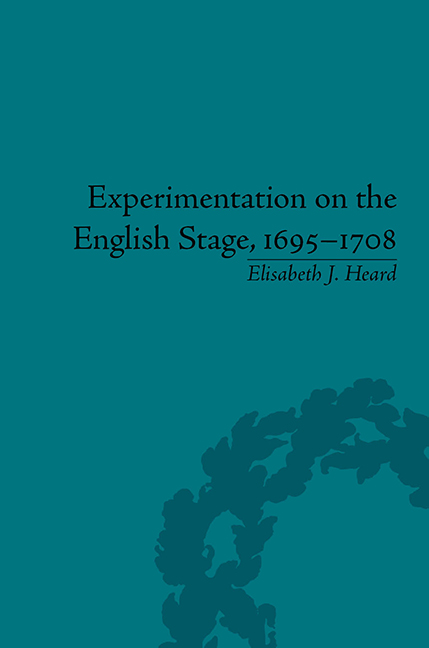Book contents
- Frontmatter
- CONTENTS
- Acknowledgements
- Introduction
- 1 The London Theatre World in the 1690s
- 2 Origins of ‘Humane Comedy’: Farquhar, Congreve, Cibber and Vanbrugh
- 3 Experimentation at the Turn of the Century
- 4 Successful Experimentation: The Recruiting Officer and The Beaux Stratagem
- 5 Farquhar's Contributions and the Post-1707 Theatre
- Conclusion: Farquhar and Anglo-Irish Drama
- Notes
- Works Cited
- Index
1 - The London Theatre World in the 1690s
- Frontmatter
- CONTENTS
- Acknowledgements
- Introduction
- 1 The London Theatre World in the 1690s
- 2 Origins of ‘Humane Comedy’: Farquhar, Congreve, Cibber and Vanbrugh
- 3 Experimentation at the Turn of the Century
- 4 Successful Experimentation: The Recruiting Officer and The Beaux Stratagem
- 5 Farquhar's Contributions and the Post-1707 Theatre
- Conclusion: Farquhar and Anglo-Irish Drama
- Notes
- Works Cited
- Index
Summary
Catholics versus Protestants, unstable political times and war – this was the climate the late seventeenth-century audience was living in. The political unease trickled down to all levels of society, from the nobles to the servants, and all could find a seat at the theatre. Comedy that was written decades ago was still entertaining, but new plays written using the same conventions were booed. Playwrights struggled to curry the audience's favour, which was important, since the ability to earn a living as a playwright rested almost exclusively in the audience's hands. The more nights a play ran, the better opportunity the playwright had to get paid, and by the latter half of the 1690s, the split in the United Company fostered the competition that was necessary to spur on the desire for the next fresh, new play that would fill the seats.
The Impetus for Change
When Charles II was restored to the throne and the theatre was reopened, people from all social classes filled the seats. The audience was divided along social lines, with a seating arrangement that reflected the hierarchy. The boxes held the members of the highest level of society. The King sat in the central box, with other members of society who wanted to be visible sitting in the boxes to the sides of the theatre. Moving upwards from the boxes correlated with a decrease in social status, with some members of the ‘middle class’ (apprentices, poets, guildsmen, etc.) seated in the middle gallery, and servants, coachmen and foot-men seated in the upper gallery. The pit, located on the ground floor, brought together an eclectic mix of men and women. At any given performance there could be members of the court, merchants, lawyers, respectable women, young gallants and prostitutes all seated in the same area. Lords and ladies, dukes and duchesses, members of Parliament and naval officers all watched the plays along with the fops, beaux, wits and footmen. On the whole, the theatre was a reflection of the society – people with various political views from different levels of society interacting in a basically civil manner.
- Type
- Chapter
- Information
- Experimentation on the English Stage, 1695–1708The Career of George Farquhar, pp. 11 - 22Publisher: Pickering & ChattoFirst published in: 2014



